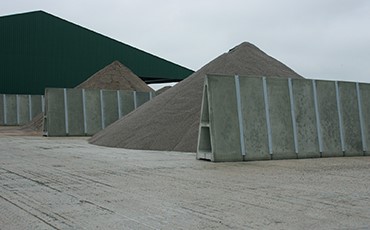Rocla’s Engineering Department recently partnered with a mining-sector client to design a specialised solution for constructing 3-metre-high storage bins capable of handling material with a bulk density of 2 700 kg/m³. Complicating the task further, the material needed to be stored at a 25° angle of repose—meaning the stockpile would rise to nearly 6.2 m above floor level at its peak. Each three-sided bin needed to accommodate roughly 525 m³ and 1 400 tons of product, and a total of 14 such bins—amounting to 7 350 m³ and 19 600 tons—were required. Rocla recommended its robust and versatile ALFABLOC walling system.
Although the ALFABLOC range includes 1.2 m, 2.4 m, and 3 m units, the standard 3 m blocks are rated for a maximum bulk density of only 1 600 kg/m³ in a free-standing configuration under 25° repose loading. Rocla Sales Engineer Justin Kretzmar noted that this presented a significant challenge—requiring nearly a 70% increase in capacity. Rocla’s engineering team developed an effective solution: anchoring the blocks to an engineered surface bed using chemical anchors and redesigning the internal steel reinforcement. This resulted in the creation of a new Heavy-Duty Alfabloc range, strong enough to meet the demanding load requirements.
Lead time also posed challenges. Rocla’s production facilities were originally designed for projects involving fewer than 100 blocks, yet this project required almost 500 heavy-duty units, including many 90° corner blocks. In response, Rocla’s engineering and fabrication teams built new moulds and redesigned them for faster cycling, ensuring daily production. After twelve months of design work, planning, and project approvals, Rocla received an order for 496 heavy-duty Alfablocs, totalling 1 400 tons of concrete and requiring approximately 500 truckloads for delivery. The blocks were delivered by March 2024, marking the completion of a massive year-long production effort.
The Alfabloc system is designed for structural efficiency, versatility, and durability. Under typical conditions the units experience low internal stresses while providing a strong, reliable retaining structure. For granular materials—often the most demanding—their stability is enhanced by frictional forces acting along the wall face. The blocks are also resilient against incidental impacts from loading machinery, although consistent or forceful striking may cause damage, as with any thin-walled concrete structure.
Alfablocs are typically placed on existing or newly prepared concrete surface beds. Depending on the characteristics of the stored material, they may be installed free-standing or bolted down. Each block includes a full-length tongue-and-groove joint that helps distribute loads horizontally and provides a secure connection. Where a complete seal is needed—for example, with organic materials—galvanised or painted steel plates can be fixed over the joints. A top channel not only strengthens the alignment but also provides mounting options for security features such as razor wire, CCTV, or other devices, with internal cavities offering protected routing for cables.
The ALFABLOC system is widely used across the plastics, chemicals, construction, and mining industries for applications including temporary security walling, stockpile containment, and material separation. Rocla even employs the system internally at its Polokwane facility for sand storage. Clients favour it for its quick installation, minimal downtime, and strong physical security performance. Built from 35 MPa concrete and reinforced with steel mesh, Alfablocs form a tough, intrusion-resistant barrier, with their smooth off-shutter finish and steep profile discouraging climbing.
Through innovation and engineering expertise, Rocla’s custom heavy-duty Alfabloc solution successfully met the mining client’s demanding requirements, reinforcing the system’s reputation as one of the most versatile and reliable bulk material storage solutions on the market.




